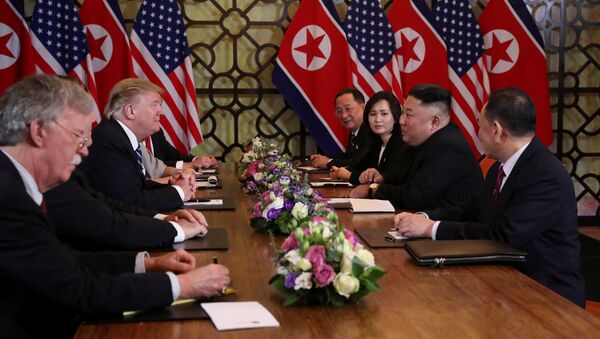"It's a setback for Donald Trump as a political leader; it's a setback for Kim Jong Un, perhaps as a political leader, but certainly as the leader of the country of people who want to… escape sanctions," Becker told Radio Sputnik's Loud & Clear on Thursday.
"But most importantly, it's a big loss for the people of Korea. We're talking about human beings, and we're talking about a part of the world that's been at war since 1950… 10 million families divided, who couldn't see each other and have not seen each other because of this artificial division," he stressed.
Speaking at a news conference, Trump told reporters that "it was all about the sanctions" and that there were no immediate plans for a third summit, although he is holding out hope for a "good outcome" in the future.
"They wanted the sanctions lifted in their entirety," Trump said. "And we couldn't do that."
Reporting from the scenes of the since-ended summit in Hanoi, Vietnam, Becker told hosts John Kiriakou and Walter Smolarek that "it was very surprising" when the talks broke down.
"At the sort of late morning, we got the word that something had changed, that there was some scheduling issues. Then the word came that the signing ceremony in fact was canceled," Becker recalled. "Donald Trump was going to hold a press conference by himself, not with Kim Jong Un, before he headed back on Air Force One earlier than scheduled."
"At the end, it became clear to everyone that whatever they expected to have happened came undone… maybe not for the hardened, cynical, imperial-orientated White House Press Corp, but for almost all the other journalists, and certainly for the people in Vietnam, and most importantly for the people of Korea, there can't be but disappointment in terms of the outcome here."
With much of the US media covering the Trump-Kim summit as a win for Kim and and loss for Trump, Becker explained to Kiriakou that it was just a sign that "they have a consensus position of absolute hostility towards peace breaking out in the Korean Peninsula."
"Their coverage should be understood as having a political agenda behind it," he said. "For the American media to say, ‘Oh this is a win for Kim Jong Un and a setback for Trump' and reduce it to that and ignore the human factor shows that these people actually don't care about human beings."
"That should be a big takeaway as we continue to assess and analyze why this happened and what's coming next," he added.
Reacting to the failed talks, a statement from South Korea's presidential office referred to the result as "regrettable," but said that both world leaders made "more meaningful progress than at any time prior."
Trump and Kim previously had their first-ever meeting in June 2018 in Singapore. That summit ended with a four-point declaration that paved the way toward renewed bilateral relations between both countries and the denuclearization of the Korean Peninsula, among other goals.



